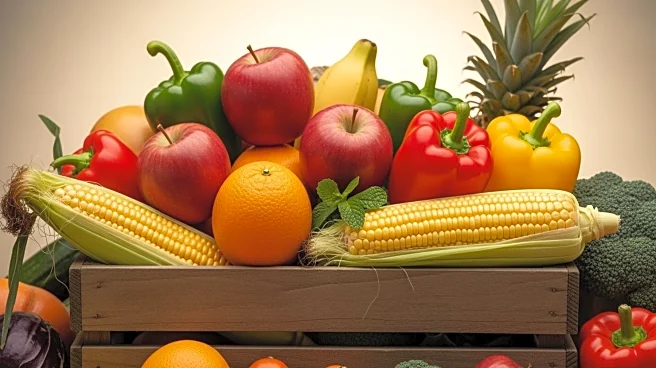What's Happening?
The Department of Labor has issued a warning that the Trump administration's immigration enforcement policies are negatively impacting the agricultural sector by reducing the availability of labor. This
development is causing concerns about the stability of domestic food production and potential increases in food prices for U.S. consumers. The Labor Department highlighted the issue in a document filed with the Federal Register, noting that the cessation of illegal immigration is threatening the agricultural workforce. The department emphasized the need for immediate action to provide stable and lawful labor sources to prevent widespread disruption in the agricultural sector. Additionally, a new rule has been implemented to lower wages for seasonal migrant workers under the H-2A visa program, aiming to facilitate legal access to immigrant workers for farmers.
Why It's Important?
The reduction in available agricultural labor due to immigration enforcement poses significant risks to the U.S. food supply chain and national security. Farmers rely heavily on immigrant workers, and the lack of a stable workforce could lead to increased food prices and decreased production. The new rule lowering wages for H-2A workers is expected to save employers billions annually, but it also highlights the dependency on immigrant labor. This situation underscores the need for comprehensive immigration reform to ensure a stable workforce for essential industries like agriculture. The broader impact includes potential economic repercussions for consumers and increased pressure on policymakers to address labor shortages in agriculture.
What's Next?
The Department of Labor's warning may prompt further discussions and actions regarding immigration policies and labor regulations. Stakeholders in the agricultural sector, including farmers and industry leaders, are likely to advocate for legal work permits and protections for immigrant workers. The new wage rule for H-2A workers could lead to an increase in hiring, but it may also spark debates about fair labor practices and the long-term sustainability of relying on immigrant labor. Policymakers may need to consider balancing immigration enforcement with the economic needs of the agricultural sector to prevent disruptions in food production and pricing.
Beyond the Headlines
The immigration crackdown and its impact on agriculture raise ethical and social questions about labor rights and the treatment of immigrant workers. The dependency on immigrant labor highlights the challenges of finding domestic workers willing to fill these roles, which may require addressing broader societal attitudes towards agricultural work. Additionally, the situation may influence public opinion on immigration policies and their implications for national security and economic stability.








